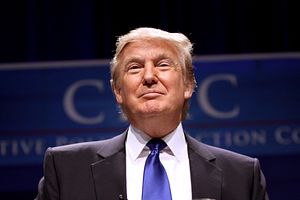Speaking on Fox News on Sunday, U.S. President-Elect Donald Trump made his first at-length direct comments on U.S. policy toward Taiwan since a historic phone call between him and Taiwanese President Tsai Ing-wen more than a week ago.
“I fully understand the ‘one China’ policy, but I don’t know why we have to be bound by a ‘one China’ policy unless we make a deal with China having to do with other things, including trade,” Trump remarked.
The “one China” policy is the United States’ existing policy, which officially recognizes and maintains diplomatic ties with the People’s Republic of China and not the Republic of China government on Taiwan.
U.S. ties with the people of Taiwan take place under the Taiwan Relations Act. The United States formally severed diplomatic ties with Taiwan and recognized the PRC in 1979 under President Jimmy Carter.
As he has done on Twitter, Trump used the interview to criticize China for currency manipulation, its activities in the South China Sea, and its North Korea policy.
“I mean, look,” he added, “we’re being hurt very badly by China with devaluation; with taxing us heavy at the borders when we don’t tax them; with building a massive fortress in the middle of the South China Sea, which they shouldn’t be doing; and frankly, with not helping us at all with North Korea.”
“I don’t want China dictating to me and this was a call put in to me,” Trump said. “It was a very nice call. Short. And why should some other nation be able to say I can’t take a call?”
“I think it actually would’ve been very disrespectful, to be honest with you, not taking it,” Trump continued.
After Trump’s phone call with Tsai, China’s reaction was fairly muted toward the United States, with the Chinese foreign minister effectively blaming Taiwan for playing a “little trick.” On Monday, however, a Chinese foreign ministry spokesperson expressed China’s “serious concern” over Trump’s latest remarks. Noting that Beijing considers Taiwan issues a “core interest,” spokesperson Geng Shuang said, “Upholding the ‘one China’ principle is the political basis for developing China-U.S. ties.”
He continued: “If this basis is interfered with or damaged then the healthy development of China-U.S. relations and bilateral cooperation in important areas is out of the question.”
Continued U.S. recognition of the “one China” policy is a prerequisite for diplomatic relations with China. Trump’s suggestion that Taiwan could be used as just another bargaining chip in bilateral diplomacy with China will cause serious concern in Beijing.
As I discussed last week, Trump, more so than any U.S. president since diplomatic normalization with China, is looking to link economic and security issues in his diplomatic approach to China, presumably with the intention of making deals across a range of issues.
Trump remains president-elect and though observers in China may grow increasingly concerned at the prospect of a revision to U.S. Taiwan policy under the incoming president, China is playing it cool for now.
Taiwan’s motivations, which I discussed at length last week, are carefully considered for now. After the call, Tsai took pains to emphasize that the call between her and Trump did not signal any imminent change to the status quo.

































